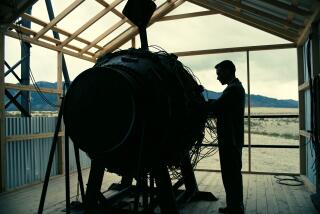Iwo Jima, A-Bomb Attacks
- Share via
* Re “Iwo Jima: Commemorating the Past While Ignoring its True Meaning,” Opinion, March 19:
The commemoration on Iwo Jima did not ignore the true meaning of the past, or the sacrifices that were made by the individuals who commemorated the battle that took place there. The historical significance of the Pacific war may be lost on many of today’s generation, but not because a handful veterans met to remember what occurred 50 years ago. The commemoration was for the veterans of both sides. I find it difficult to believe that the incredible human emotions that those soldiers went through have been completely sublimated into “hand-clasping and back slapping . . . of former enemies.” Bruce J. Schulman’s view that the unification of former U.S. Marines and military personnel of Imperial Japan who have paid a terrible common price somehow cheapens the purposes of the war is reasoning that is unreasonable.
The horror that was Iwo Jima can scarcely be imagined by those who were not there, or who have not experienced similar conflicts. While it may be true that history is being constantly revised (I think it is called “historical perspective”), it is the responsibility of historians to document and explain what actually happened and why it is significant to us. Denigrating the efforts of common old warriors to achieve some type of peace with the past does not achieve this purpose.
MIKE McGLOTHLIN
Long Beach
* Nagasaki Mayor Hitoshi Motoshima is in total denial when he asks, “Does avoiding the death of servicemen justify the sacrifice of tens of thousands of guiltless noncombatants?” (March 16). Those “servicemen” were the “guiltless noncombatants” on Dec. 7, 1941.
ANN T. ANDRUS
Palos Verdes Estates
* Re “A Case of Selective Memory,” editorial, March 20:
The arguments put forward appeared gratuitous and unconvincing. The conclusion concerning the A-bomb attacks on Hiroshima and Nagasaki was correct. The historical truth was that countless American and Japanese lives were spared because the dropping of the A-bombs hastened the end of the war. Moreover, the bombs kept Japan from being divided into North and South by Stalin’s aggressive army. These Soviet forces did not stop attacking Japan’s proper islands even after Japan’s surrender, and occupied the Northern Territories by Sept. 3, 1945, the day after V-J Day. The bombs allowed the U.S. to occupy Japan exclusively. Japan was fortunate in that the U.S. occupied its lands and democratized the Japanese. It goes without saying that the outcome was far better than a Communist occupation.
In his remarks the mayor of Nagasaki, however, challenged the traditional reasons for the bombings, and argued that the second bomb on Nagasaki was certainly unnecessary to bring about Japan’s surrender. His remarks should provoke some serious soul-searching in America.
Perhaps, as the mayor suggested, the other purpose of the bombings was to intimidate the Soviet Union and to justify the cost of developing nuclear weapons.
I say weapons advisedly because a different type of A-bomb was used against each city, something that in retrospect could be viewed as a test of both bombs by a not-too-suspicious mind.
MAKOTO KITO
Washington D.C. Bureau
Yomiuri Shimbun Daily
* Regarding your editorial, yes, all the war’s innocent victims should be mourned. And yes, it should be remembered that countless lives were spared because of the bombings. But at what price? the proliferation of nuclear weapons makes potential victims of us all.
VIOLET RYDER
Ventura
More to Read
Sign up for The Wild
We’ll help you find the best places to hike, bike and run, as well as the perfect silent spots for meditation and yoga.
You may occasionally receive promotional content from the Los Angeles Times.






